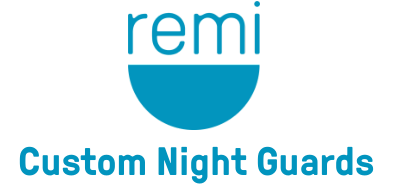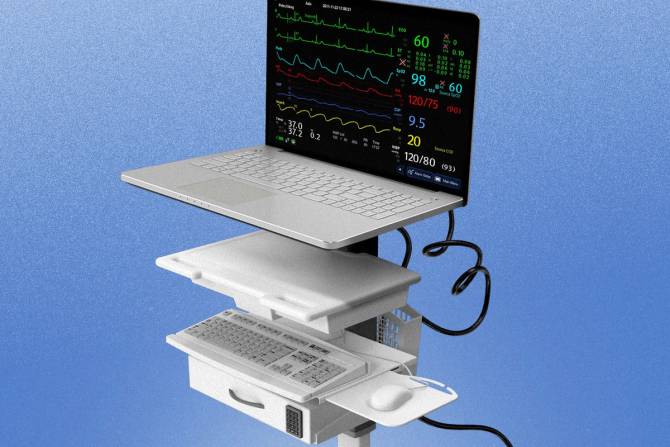Happy Wednesday! This month, Healthcare Brew has been focusing on adolescent mental health, which was deemed to be in crisis during the pandemic. A new report from the CDC found some signs of improvement, like fewer emergency room visits in fall 2022 compared to 2021. But the crisis is still “ongoing,” and prioritizing early identification, trauma-informed interventions, and prevention strategies is critical.
In today’s edition:
 Tech integration Tech integration
 Mental health in the ED Mental health in the ED
 Changing culture Changing culture
—Shannon Young, Maia Anderson, Adam DeRose
|
|
Amelia Kinsinger
More patients are turning to wearable technologies, like Apple Watches and Oura Rings, to monitor everything from their sleep cycles to heart health. But when those devices detect potential medical emergencies, they often don’t immediately connect patients with a healthcare provider. On top of that, those data points aren’t always integrated into a patient’s electronic health record or future patient care.
That disconnect underscores the challenges facing digital healthcare startups. And it’s why health systems should work with investors and tech entrepreneurs to develop and implement digital health and artificial intelligence (AI) capabilities, according to a new study from Weill Cornell Medicine and University of Miami researchers.
“When [patients] have a medical crisis—or they are suffering from chronic conditions—they seek care in hospital systems. You must have the most innovative [technologies], which are coming from early stage startups, operationalized in the systems,” Iredia Olaye, a researcher partnered with Weill Cornell and the CEO of innovation firm Covered By Group, told Healthcare Brew.
The study, which examined the challenges of integrating new technologies in clinical practice, identified four primary barriers: insufficient knowledge of health system technology procurement protocols, which can vary across facilities; strict regulations and clinical trial requirements; obstacles in the health system technology procurement process; and competitive disadvantages for smaller startups.
Researchers also found that venture capital financing for early-stage digital health startups affected business model selection; entrepreneurs are shifting away from selling directly to health care systems to direct-to-consumer and direct-to-employer models.
Olaye argued that selling directly to consumers and employers is “much simpler” for companies to hit venture metrics and scale quickly than selling to healthcare systems, for which approval can take anywhere from 12 to 24 months. It also gives companies “more control” over marketing.
Keep reading here.—SY
Do you work in healthcare or have information about the industry that we should know? Email Shannon at [email protected]. For completely confidential conversations, ask Shannon for her number on Signal.
|
|
We haven’t figured out a way to unplug from life’s stresses when we hit the hay—yet. We just deal with ’em in a different way. Bruxism, aka grinding or clenching your teeth while you sleep, can cause major damage to your smile, your sleep, and your well-being.
But dentists have spoken: Remi’s night guards strike the balance between cost effective and teeth protective. Instead of settling for a $500+ night guard from a dental office, Remi offers custom guards at 80% less than what dentists charge.
Each night guard is made in Remi’s own lab by a highly skilled team of dental pros. And with their at-home kit, you can get your perfect fit without needing to take a trip to the dentist.
Protect your smile with Remi. Get your custom guard with a 45-Night Perfect Fit Guarantee.
|
|
Seventyfour/Getty Images
During the pandemic, the number of kids visiting emergency departments (ED) for mental health issues skyrocketed; the weekly tally of children’s ED visits for suspected suicide attempts rose 39% from 2019 to 2021.
Even though timely follow-up care for self-harm or mental illness has been shown to prevent hospitalizations, reduce the chances of a repeat visit, and improve overall outcomes, less than a third of children receive follow-up care within seven days of their ED visit, and just over half (56%) receive care within a month, according to a recent study from Ann & Robert H. Lurie Children’s Hospital of Chicago. More than a quarter of the children in the study returned to the ED within six months.
“Pediatric ED visits for mental health conditions are rising in the United States, with the majority culminating in discharge,” the study authors wrote. “Timely outpatient follow-up after a mental health ED discharge may facilitate continuity and ongoing engagement in mental health care.”
Avoidable ED visits cost the US healthcare system a pretty penny—especially mental health ED visits.
Patients with commercial health insurance make 18 million avoidable ED visits annually, which adds $32 billion in US healthcare costs, according to a 2019 study from UnitedHealth Group. The biggest driver of those avoidable visits is mental health, with ED visits for mental health issues costing about $4.6 billion annually, according to a 2019 analysis from health services firm Premier.
To conduct the Lurie Children’s study, researchers reviewed records of more than 28,500 children aged 6 to 17 who were enrolled in Medicaid and visited the ED for a mental health episode at least once between January 2018 and June 2019.
Keep reading here.—MA
Do you work in healthcare or have information about the industry that we should know? Email Maia at [email protected]. For completely confidential conversations, ask Maia for her number on Signal.
|
|
Jennifer Bingaman
Jennifer Bingaman approaches HR at Washington-based healthcare start-up MCG Health from a “humanistic perspective.” She has a counseling background, and when people interact with her, she aims to make sure “they feel seen and heard.” At MCG Health, Bingaman is trying to build a culture that allows colleagues to do meaningful work that also moves the business forward. “The goal is not to exhaust [employees]. The goal is to not squeeze them until they’re dry,” she said.
She’s most interested in using her role in HR leadership to advance social justice causes and support people in her workplace and in her community.
What’s the most fulfilling aspect of your job?
I take care of people. My background is in mental health and communication, so at my core, I am always trying to connect people to each other, to resources, to information—all in service to an enriched human experience. I think work can be transformative if we can all unite with each other to make it better and advocate for the future we want. As someone in a leadership position, I now have the privilege and the power to effect change inside of old or outdated systems—a big one is how and why we work.
What trend in HR are you least optimistic about? Why?
I want us to give up on the idea that we will ever “return” to the office as we knew it; I am still seeing and hearing people cling to this idea. MCG Health has been strategic about our use of office space. We’ve taken the approach to create monthly weeks where people come for culture and collaboration—not necessarily productivity, although that is certainly a potential side effect.
Keep reading at HR Brew.—AD
|
|
Francis Scialabba
Today’s top healthcare reads.
Stat: About two-thirds of the thousands of foreign-born nurses looking to work in the US will not be able to immigrate due to a State Department freeze. (Politico)
Quote: “I wish I had learned more about the business of medicine in medical or nursing school or residency.”—N. Adam Brown, a practicing emergency medicine physician, on what medical professionals routinely tell him (MedPage Today)
Read: North Carolina politicians are engaged in a “showdown” to allow abortion to remain legal in the state. (the New York Times)
|
|
Catch up on the top Healthcare Brew stories you may have missed:
|
|
|
Written by
Shannon Young, Maia Anderson, and Adam DeRose
Was this email forwarded to you? Sign up
here.
{if !contains(profile.lists,"Marketing Brew") || !contains(profile.lists,"CFO Brew") || !contains(profile.lists,"HR Brew") || !contains(profile.lists,"EmTech Brew") || !contains(profile.lists,"IT Brew") || !contains(profile.lists,"Retail Brew") || !contains(profile.lists,"Healthcare Brew")}
Take The Brew to work
{/if}
{if !contains(profile.lists,"Marketing Brew")}
-
Marketers:
{if !contains(profile.lists,"Marketing Brew")}
Marketing Brew
{/if}
{/if}
{if !contains(profile.lists,"CFO Brew") || !contains(profile.lists,"HR Brew")}
-
Corporate:
{if !contains(profile.lists,"CFO Brew")}
CFO Brew
{/if}
{if !contains(profile.lists,"HR Brew")}
HR Brew
{/if}
{/if}
{if !contains(profile.lists,"EmTech Brew") || !contains(profile.lists,"IT Brew")}
-
Tech:
{if !contains(profile.lists,"IT Brew")}
IT Brew
{/if}
{if !contains(profile.lists,"EmTech Brew")}
Tech Brew
{/if}
{/if}
{if !contains(profile.lists,"Retail Brew")}
-
Retailers:
Retail Brew
{/if}
{if !contains(profile.lists,"Healthcare Brew")}
-
Healthcare:
Healthcare Brew
{/if}
{if !contains(profile.lists,"Daily Business") || !contains(profile.lists,"Money Scoop") || !contains(profile.lists,"Money With Katie")}
Get smarter in just 5 minutes
{/if}
{if !contains(profile.lists,"Daily Business")}
-
Business News:
Morning Brew
{/if}
{if !contains(profile.lists,"Money Scoop") || !contains(profile.lists,"Money With Katie") || !contains(profile.lists,"Raise")}
-
Money & Career:
{if !contains(profile.lists,"Money Scoop")}
Money Scoop
{/if}
{if !contains(profile.lists,"Money With Katie")}
Money With Katie
{/if}
{if !contains(profile.lists,"Raise")}
Raise
{/if}
{/if}
Business education without the BS
Interested in podcasts?
|
ADVERTISE
//
CAREERS
//
SHOP
//
FAQ
Update your email preferences or unsubscribe
here.
View our privacy policy
here.
Copyright ©
2023
Morning Brew. All rights reserved.
22 W 19th St, 4th Floor, New York, NY 10011
|
|








